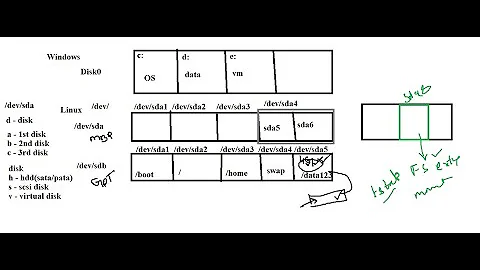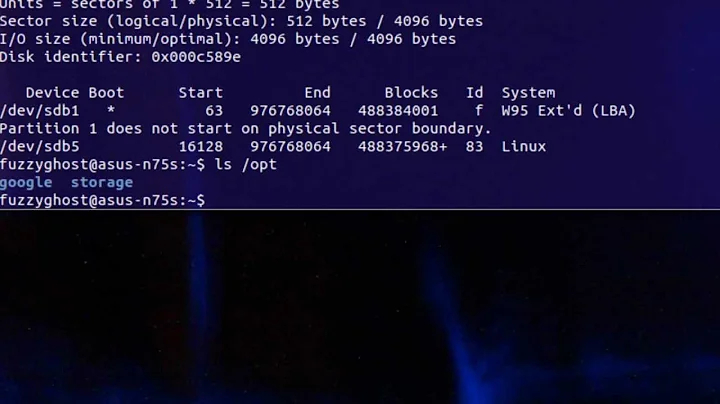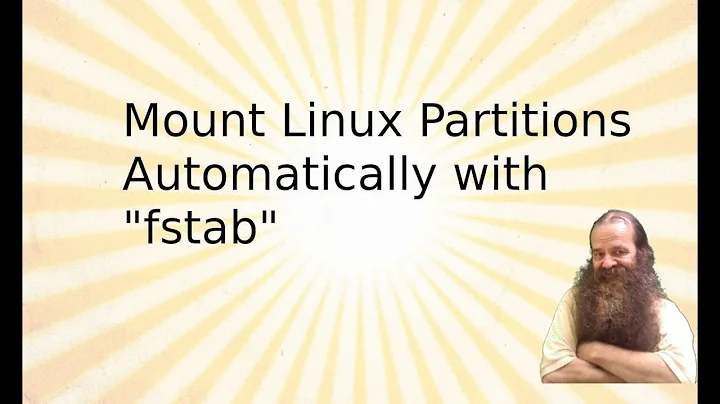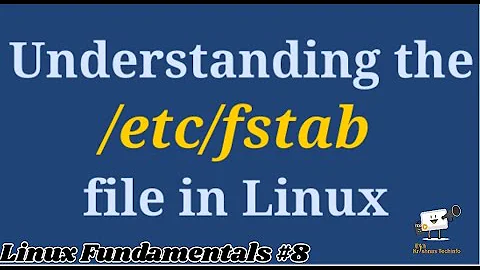Modify fstab entry so all users can Read and Write to an EXT4 Volume
Solution 1
The mount option user only allows the filesystem to be mounted by any user. The rw option makes the filesystem not readonly. You will have to use permissions to make the parent directory writeable.
chmod 777 /media/foo
The chmod command you show only affects the existing files within /media/foo.
Solution 2
I think it would be simpler to change the fstab entry to:
/dev/sda8 /media/foo ext4 rw,user,exec,umask=000 0 0
umask=000 means that anyone can read, write or execute any file or directory in foo.
The usual default is 022, which means that users cannot write.
Solution 3
I had the same problem on openSUSE, but I think the solution can apply to this too. All the users I want to share the mounted filesystem belong to the same primary group: users
I have the following line in my fstab:
/dev/<partition> <mount_point> ext4 rw,acl 0 0
and I ran the following commands:
sudo chgrp -R users <mount_point>
sudo setfacl -d -m g::rwx <mount_point>
so that newly created files or directories get those permissions. This implies that you have the acl package installed.
Solution 4
Well for one thing, you want to make sure the directory of /media/foo itself is writeable. If it isn't already, run the following command:
chmod +w /media/foo
Remember, star only applies to the visible contents of the directory, not the directory itself nor any files that are not visible.
Solution 5
A few years ago I have set the mount point's group to the plugdev group, added the user to that group. This way, by creating new groups, it is possible to give permissions on a per user basis. For home usage, it's enough to set mount point permissions to others: read/write/execute as written above.
I did it with 'sudo nautilus &' in terminal and right click -> properties -> rights, but any other file manager running as root would be fine.
Related videos on Youtube
user3441903
Updated on September 17, 2022Comments
-
user3441903 almost 2 years
I have an Ubuntu 10.04 box with an EXT4 partition. This partition is set to automatically mount in
/etc/fstab. For the purposes of this post, we'll call it:/media/foo.Unfortunately, only
rootcan create/delete files/directories on the root filesystem offoo. For other users to perform file/io on this volume,rootneeds to create a directory andchmodthe permissions to others.I would like to mount the volume such that anybody would be able to read/write to the volume without the need of
roottochmod.Below is my
fstabentry:/dev/sda8 /media/foo ext4 rw,user,exec 0 0The entry originally had
defaultsinstead ofrw,user,exec. I added the additional entries, namely,rwso any user can read/write.Unfortunately, the
fstabentry does not work. It mounts fine, but it still requiresrootto intervene.And, just in case anybody asks, simply running:
chmod -R 777 *on/media/fooasrootdoes not work. -
Daniel almost 12 yearsumask is only an option for ntfs/vfat partitions. mount will not like umask on an ext filesystem.
-
 Ivan Balashov almost 10 yearsWhat is the best place in Ubuntu to add this command at startup?
Ivan Balashov almost 10 yearsWhat is the best place in Ubuntu to add this command at startup? -
 Dennis Williamson almost 10 years@IvanBalashov: You can use an
Dennis Williamson almost 10 years@IvanBalashov: You can use an@rebootentry in/etc/crontabamong other possibilities. -
 m3nda about 9 yearsWow, i must start to guess those things :D thank you a lot.
m3nda about 9 yearsWow, i must start to guess those things :D thank you a lot. -
 George Udosen over 7 yearsIf it is an encrypted directory say
George Udosen over 7 yearsIf it is an encrypted directory say/homewill this be mounted in the/etc/crypttab? -
user1251840 over 7 yearsAgree with the chmod, but add a: chmod +t /media/foo to enable users to create their own subdirectory
-
 Binar Web over 3 yearsI think a better aproach would be
Binar Web over 3 yearsI think a better aproach would berw,user,exec,mode=1777 -
 nyanpasu64 over 2 yearsOn my machine (Arch Linux), ext4 recognizes neither umask=000 nor mode=1777...
nyanpasu64 over 2 yearsOn my machine (Arch Linux), ext4 recognizes neither umask=000 nor mode=1777...




